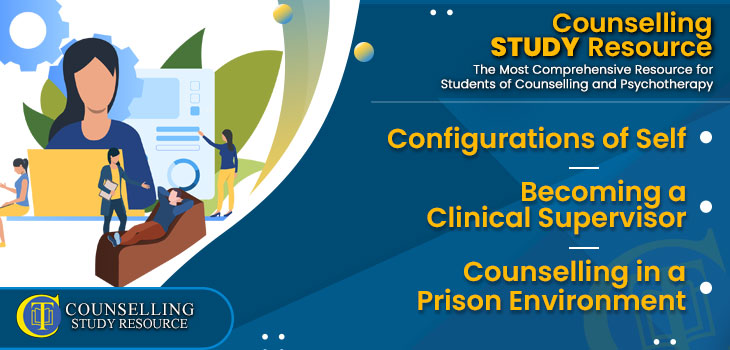225 – Becoming a Clinical Supervisor
Configurations of Self – Counselling in a Prison Environment
In Episode 225 of the Counselling Tutor Podcast, your hosts Rory Lees-Oakes and Ken Kelly are back with this week’s three topics:
- In ‘Counselling Foundations’, we’ll discuss configurations of self.
- Then in ‘Focus on Self’, we’ll think about whether you might be ready to become a clinical supervisor, and why you should consider it.
- Finally in ‘Practice Matters’, Rory speaks with Wayne Lawrence about his amazing work counselling in a prison environment.
Configurations of Self [starts at 2:07 mins]
Counselling Foundations is sponsored by
Counselling Skills Academy
Learn counselling techniques by seeing counselling skills used in real sessions by qualified therapists.
Real sessions - real-life presentations - real skills.
In this week’s ‘Counselling Foundations’, we’ll look at the work of Dave Mearns on configurations of self.
The key points of this discussion include:
- Examples of these configurations of self are the different emotional voices you might find inside you, such as anger or excitement.
- These configurations of self can take over at any time.
- Recognising the voice of the client will allow you to meet them there and better understand their frame of reference.
- Each voice should be recognised and accepted – speak directly to the sub personality in order to acknowledge it; this will enable the client to feel heard.
- By watching and listening carefully, you’ll be able to recognise a client’s shift into, for example a frightened voice, and adapt your approach accordingly.
- Have a go at identifying some of your own voices and situations that they may arise.
Free handout download on Configurations of Self is available in the green button above.
Becoming a Clinical Supervisor [starts at 14:30 mins]
To be a supervisor is an incredible service to others, and in this section, Rory and Ken share and discuss some of their own experiences and opinions on training to become a clinical supervisor.
The main points of this discussion are:
- Becoming a clinical supervisor is a commitment, and a massive step in terms of service.
- You’ll be helping to develop other therapists, and offer support.
- Create a consultative environment that will be greatly appreciated.
- ‘CV gold’ – as another level of study, it will enhance your employability.
- The process from start to finish may take up to a year to complete.
- After the pandemic, there is a higher demand for supervisors that are able to work online.
- If you have a lot of skills and a lot of passion, why not take on this development.
Counselling in a Prison Environment [starts at 29:42 mins]
The National Counselling Society is proud to sponsor Practice Matters.
NCS are really excited to have launched their Children and Young People Therapist Register for counsellors working with the younger age group.
In this week’s ‘Practice Matters’, Rory speaks with Wayne Lawrence about his experiences of counselling in a prison environment.
The key factors of this discussion include:
- For prisoners, it’s important that they can have that one-on-one relationship, a single point of reliable contact.
- Sessions are bound by the laws and rules of the prison, e.g. a session will have to come to an immediate end if there is a lockdown.
- There is still a person-centered approach to the client – it offers communication for the client separate from prison staff.
- It’s important to be congruent.
- Be mindful that some clients feel they are not able to show vulnerability once they leave the room.
- Sessions offer permission to be something other than a tough exterior.


